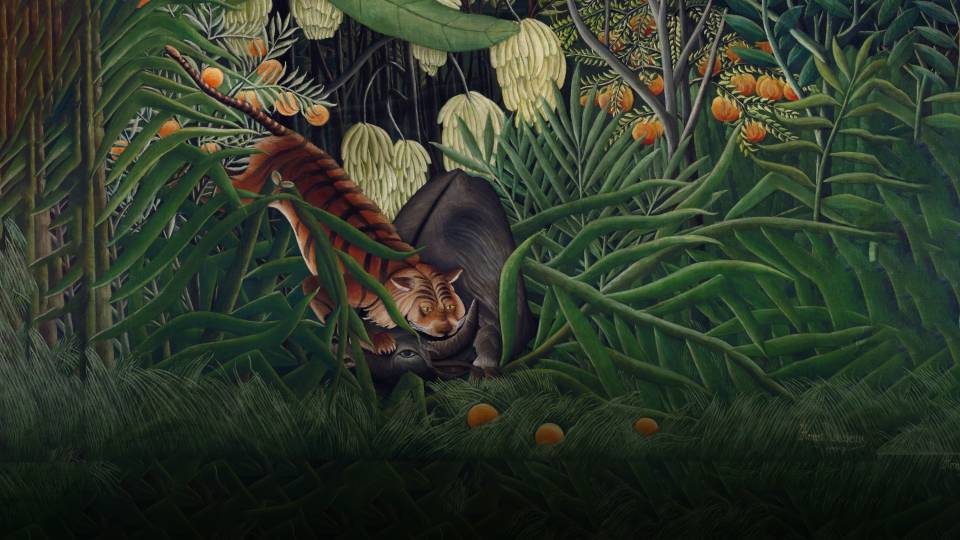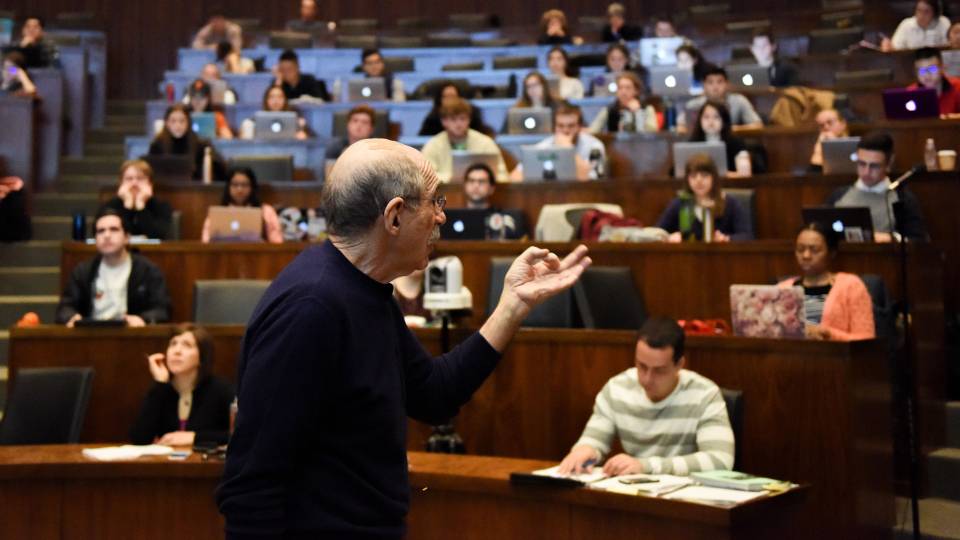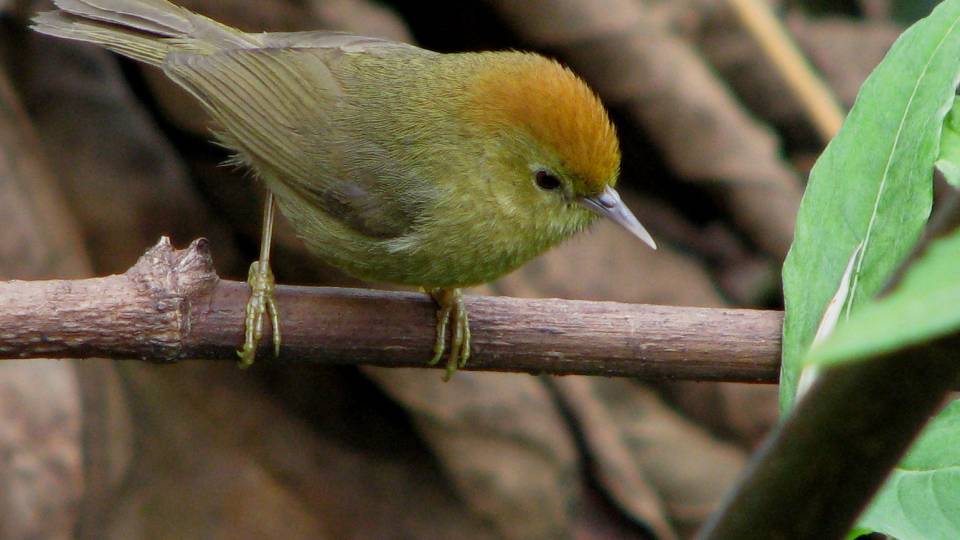Wilcove blends science, policy to advance conservation
From the Nov. 24, 2008, Princeton Weekly Bulletin(Link is external)
Ask Princeton ecologist David Wilcove(Link is external) about the largest threat to the greatest number of species in the next 25 years, and he’ll give you a two-word answer.
Global warming? No, oil palm.
Grown in tropical forests around the world, most abundantly in Southeast Asia, oil palm trees are the source of fats used in myriad food products, including baked goods, nondairy creamer, margarine and shortening. The areas where these trees thrive already have suffered extensive deforestation from urbanization and logging, and the spread of oil palm agriculture is further devastating native plant and animal species.
“It’s the wrong crop being grown in the wrong places at the worst possible time,” said Wilcove.
In studying the ecological concerns related to oil palm, Wilcove also is analyzing the industry’s economic and social impact -- an approach that defines his mission as a professor of ecology and evolutionary biology(Link is external) and public affairs(Link is external), and as director of the Program in Environmental Studies(Link is external). In his research and teaching, Wilcove marries scientific expertise with policy studies in trying to identify solutions to some of the world’s most pressing environmental problems.
This integrated view of problem-solving helped shape the career of Will Turner, who worked with Wilcove at Princeton as a postdoctoral researcher before joining Conservation International, an Arlington, Va.-based nonprofit organization.
“This is the most important lesson I learned from Dr. Wilcove: To solve the world’s biggest challenges you have to base your work on sound science and scholarship at the same time you get your feet on the ground and make sure your work actually impacts the real world,” Turner said.

Wilcove meets with two undergraduates enrolled in the Program in Environmental Studies, seniors John Taggart (left) and Chenchen Shen. Wilcove directs the environmental studies certificate program and is co-teaching one of its core introductory courses this fall.
What makes the oil palm example so fascinating, Wilcove said, is that the business “is quite profitable and some of the oil palm growers provide important benefits to workers -- housing, health care, education,” he said. “So we can’t argue that it’s harmful to workers, and we can’t boycott it because it is used in countless food products. It is one of the toughest conservation problems I’ve ever tackled.”
Wilcove and Lian Pin Koh, who earned his Ph.D. from Princeton in 2008 and is now a postdoctoral researcher at the Swiss science institute ETH Zurich, recently published work in the journal Conservation Letters demonstrating -- contrary to claims made by oil palm growers in Southeast Asia -- that the crop is exceedingly bad for biodiversity. In fact, their analyses showed that traditional forests replaced with oil palm trees lose about 80 percent of their forest-dwelling birds and butterflies.
Wilcove now is working with scientists at the University of Leeds in England to understand how different degrees of logging in the Malaysian forests affect biodiversity. The goal is to determine what will be at stake if forests traditionally used for logging are converted to oil palm plantations.
The impact of oil palm agriculture is just one of the challenging ecological questions Wilcove currently is tackling. With Bethany Bradley, a postdoctoral research associate in the Woodrow Wilson School of Public and International Affairs and the Program in Science, Technology and Environmental Policy, he is investigating how climate change will affect the spread of invasive plants, including leafy spurge and cheat grass, in the American West. Understanding how these species, which often spread like wildfire at the expense of native plants, respond to global warming will be essential to the design of appropriate ecosystem restoration strategies.
Additionally, he is involved in multiple efforts related to the conservation of migrating animals. This includes research with Martin Wikelski, a former Princeton faculty member who is now a director of the Max Planck Institute for Ornithology in Radolfzell, Germany, on rest areas used by migrating songbirds during their travels.
Based on his work in this area, Wilcove wrote “No Way Home: The Decline of the World’s Great Animal Migrations,” which was released in fall 2007. The book chronicles the effects of environmental problems caused by human activities, including habitat loss and climate change, on migrating creatures of all sizes, from monarch butterflies to salmon and wildebeests.
The ecological loss is likely to be profound, according to Wilcove, and a decline in the abundance of migrating animals could have ramifications that ricochet throughout ecosystems. For instance, a reduction in the number of songbirds that migrate from Central and South America to the northeastern United States each year could set off population explosions of forest-damaging insects. In this regard, he argues, it is important to make efforts to conserve migrating animals long before they are endangered -- their very abundance is crucial to their positive ecological impact.
The intrinsic value of migrating animals -- and the wonder they inspire -- is not lost on Wilcove, either.
“I think people are inherently fascinated by animal migration,” he said. “How does a bird weighing just a few ounces go from the boreal forests of Canada to the Amazon basin? How can a salmon swim hundreds of miles upstream? How can a sea turtle spend 20 years at sea and then find its way back to the very beach it was born on, a place that it hasn’t seen since it was one day old?”

Wilcove is involved in efforts related to the conservation of migrating animals. Here, he leads ecology and evolutionary biology graduate students (background, from left) Christie Riehl, Nathan Gregory and Jim Adelman on a bird-watching expedition in the Institute for Advanced Study woods.
Coming full circle
Like the sea turtles that return to their nesting grounds, Wilcove made his own way back to his scientific birthplace, so to speak, when he joined the Princeton faculty in 2001, 16 years after receiving his Ph.D. in biology from the University. His graduate work on forest fragmentation and the decline of migratory songbirds, advised by John Terborgh, now a professor at Duke University, helped set the stage for his career.
After earning his Ph.D., Wilcove worked for multiple nonprofit environmental organizations in Washington, D.C., including the Nature Conservancy, the Wilderness Society and Environmental Defense Fund, where he served as senior ecologist for a decade before returning to Princeton. These experiences helped shape who he is as a researcher and educator today, he said.
“David is one of the few people who really understand that policy is made by setting a legal precedent that creates guidelines that can be more broadly applied,” said Andrew Dobson, a professor of ecology and evolutionary biology at Princeton who also taught Wilcove as a graduate student. “His international work on the costs and benefits of oil palm plantations in Malaysia is a fantastic example of this.” The issues he chooses to work on, Dobson said, are “solvable and … create precedents that would subtly allow the agenda to advance for the protection of species and habitats where the parties were more divided and the issues often not as clearly defined.”
This fall, Wilcove is co-teaching an introductory course in the environmental studies program with Professor Lars Hedin. In the spring, he typically teaches a graduate seminar on endangered species and ecosystems. In the classroom, he strives to show students the importance of his integrated approach to the environment.
“I like taking scientific knowledge and using it to inform policy,” Wilcove said. “None of the issues I explore are ones that can, or should, be considered purely by scientists. There are always political, social and economic dimensions. My interest is integrating science into the debate, and my goal in teaching is to get students to the point where they are able to see how science and policy intersect.”
Last spring, Wilcove helped students experience this intersection with a freshman seminar on “Wildlife, Wilderness, and the Development of the American West” that featured a trip to Yellowstone National Park.
“He arranged for us to talk to many different interest groups in the Yellowstone area so that we could try to synthesize all the conflicting issues that contribute to the management of the park and areas around the park,” said Josephine Walker, a junior majoring in ecology and evolutionary biology with a certificate in environmental studies.
Now enrolled in Wilcove’s environmental studies offering, Walker said the course exposes students to diverse viewpoints. “I have found it to be extremely interesting and valuable to learn about the different priorities that go into different opinions about environmental issues, as it helps me to create my own opinion on the issues on a balanced base of facts and arguments,” she said.
To prepare students to handle the difficult environmental challenges they will inherit, Wilcove helps them navigate problems but insists they ultimately find their own solutions.
“[Professor Wilcove] is someone who really lets students explore their own topics; rather than setting parameters, he guided me toward setting my own,” said Thomas Dollar, a 2008 Wilson School graduate, whose senior thesis on conservation in Chile was advised by Wilcove. Dollar, who is now interning with the nonprofit development and relief organization Africare through the Princeton in Africa program, credits Wilcove with shaping his interest in environmental policy.
Wilcove also applies his policy know-how to University-wide issues. He helped design Princeton’s Sustainability Plan during his four years as a member of the Sustainability Committee(Link is external) and currently serves as a member of the President’s Advisory Committee on Architecture. He said he is pleased with the increase in the use of “green” design and sustainability initiatives at the University in recent years.
“Princeton is moving in the right direction at a brisk pace,” he said.
Wilcove strives to hang onto a similarly positive view of the world’s environmental future, though he’s realistic about the fact that there are likely to be “tremendous losses” of biodiversity in the future.
“I spent 16 years in the environmental movement in D.C. -- you don’t get into that line of work if you’re not constitutionally optimistic,” he said, only half-joking. “More importantly, I try to focus on what we can do, as opposed to what we can’t prevent. As people become more aware, we’ll be able to solve more of the problems. This keeps me optimistic.”







